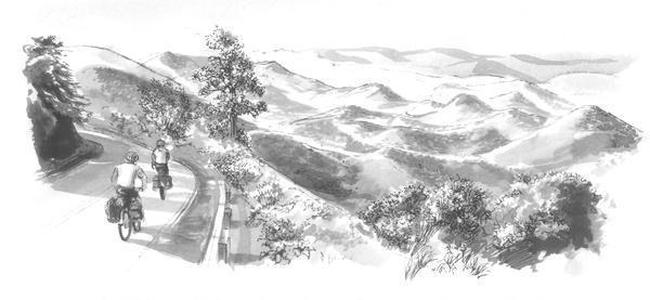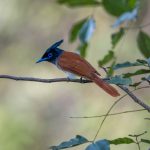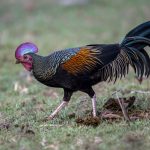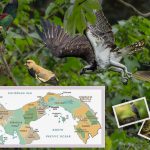
 Mark Gamin, a Cleveland lawyer, likes both birds and books, which makes him an ideal birding book reviewer. He previously reviewed Cat Wars: The Devastating Consequences of a Cuddly Killer for 10,000 Birds.
Mark Gamin, a Cleveland lawyer, likes both birds and books, which makes him an ideal birding book reviewer. He previously reviewed Cat Wars: The Devastating Consequences of a Cuddly Killer for 10,000 Birds.
If you’re a birder, it would be wonderful to know all the songs and calls, and if you’re a bicyclist, it would be wonderful to ride across the United States. For those of us who aspire to both but have, as yet, achieved neither, a good stopgap alternative is Donald Kroodsma’s quirky and pretty wonderful new book, Listening to a Continent Sing.
In May 2003, Kroodsma, an internationally known expert on birdsong, spent ten weeks, riding four thousand-plus miles from Virginia to Oregon. Most cross-continent riders go west to east, to take advantage of the prevailing winds. That Kroodsma did the opposite is testimony to his obsession with birdsong: he wanted to make sure that, in July and August, there were plenty of birds to hear. (Bicycling eastbound would put you in Kentucky or thereabouts in the hot, mostly song-less, summer, not ideal for his purposes.)
Riding into the wind is evidently part of Kroodsma’s nature. At a couple of points he reveals his loathing — not too strong a word — for the college biology department where he is a professor, and he admits that he knows birds “perhaps better than I know most of my human friends.”
Whatever: he’s a great ornithological guide on many topics. In the hybrid zone of western Missouri, he becomes enthralled with an individual who mixes the songs of black-cap and Carolina chickadees. And on the Oregon border he explains that flycatchers have their songs hard-wired in their genes and so, unlike “true” songbirds, they can’t imitate or learn new songs from other birds. (By the way, a great post on a related evolutionary topic is here.)
Kroodsma is interested, he says, not so much in identification (for him, usually, that’s the easy part), and more in trying to figure out what the bird, in that moment, is trying to communicate. Each bird, for Kroodsma, is “an individual with something to say, not just someone to be identified.”
One of the most welcome features of this splendidly-designed book is the use of QR codes in the margins of most pages. They’re akin to barcodes, readable (that is, listenable) with an app on a smartphone. As pointed out in a previous review of another book on this site, sonograms can be a struggle for amateurs; these QR codes are a breeze.
So when Kroodsma hears the first Bewick’s Wren of the trip (in the Ozarks) the reader can hear why he’s ecstatic; it’s a bird that he spent four years studying in grad school, and “a remarkable virtuoso,” he says. (The recordings are also available on the book’s well-done website.)
Though Kroodsma is first and foremost a birder, there’s interesting stuff here on other topics: the meteorological effect of the Rocky Mountains, for instance, and the luminescent quality of dogwood flowers (which aren’t really flowers at all). And there’s real good biking advice, too. Never camp on top of a pass, because riding downhill in the cold morning air “is not so much fun.”
That observation comes from Kroodsma’s riding companion, his son David, a recent college graduate and an avid cyclist, though an indifferent birder. Their relationship is sometimes tense and snarky, leavened, occasionally, by a wisecrack. Perhaps this sort of thing is to be expected whenever humans are together in close quarters for long periods. But Kroodsma pere would, the reader suspects, be a guy you would have to take frequent breaks from; his periodic asides to the reader about David can be less than charitable.
On perfect days, long distance cyclists can, like any athletes, find themselves “in the zone,” and anyone who has experienced such a feeling of sublimity will understand the best line in the book. When the Kroodsmas arrive in Colorado, it’s 75 degrees, cloudless, with Pike’s Peak in the background, and lots of new, western birds (green-tailed towhee, western meadowlark, Bullock’s oriole . . .) singing from the junipers. “How could it get any better than this?” Donald writes.
It’s that kind of joy that “Listening to a Continent Sing” can radiate, in its strangely affecting way.
LISTENING TO A CONTINENT SING: Birdsong by Bicycle from the Atlantic to the Pacific. By Donald Kroodsma. Princeton, 311 pp., $29.95.













Leave a Comment